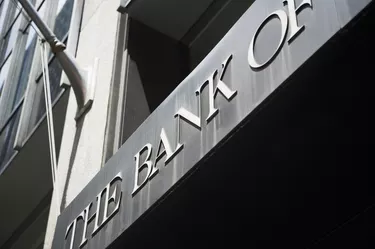
Banks establish policies and procedures based on operations manuals established in part by federal banking regulations and the bank's own set of operating principles. Policies and procedures are designed to protect consumer assets while establishing methods for efficient and positive customer service.
Transactions
Video of the Day
Banks are required to verify that transactions are done correctly for the right account holder in the correct amount. Procedures that ensure this include checking identification of the person withdrawing funds. A bank teller may also request that the customer swipe his ATM card and punch in his PIN number to verify he is the correct person. Additionally, banks require signature cards that verify signatures on checks and withdrawal slips if there are any questions or concerns.
Video of the Day
Lending
A major part of banking business is lending, which is how banks generate the bulk of revenues. Borrowers must fill out complete loan applications with contact information, Social Security numbers, work and income history as well as undergo a full credit check. Banks aim to avoid high-risk loans that can lead to default. If a loan consultant determines that a person's debt-to-income ratio is too high or her credit history is not favorable, then they must make adjustments to the loan or deny it to protect the interests of the bank.
Guarantees
Most banks are members of the FDIC (Federal Deposit Insurance Corporation). This organization was created during the Franklin D. Roosevelt administration as a means to give consumers assurances that their deposits are safe at member institutions. Member banks must maintain an FDIC member sticker and placards disclosing guarantees to consumers and provide additional information when requested. Consumers' assets are insured up to $250,000 per beneficiary, so the total on all of your accounts is covered if it's $250,000 or less.
Reporting
Banks are required to monitor large transactions. Any deposit in excess of $5,000 must be reported to the IRS. Banks also must disclose any suspicious or abnormal activity that may imply money laundering or other criminal activity. Banks also report all interest earned on savings, money market and investment accounts. You will receive a 1099 for all interest earned on your accounts that corresponds with what is reported.
Investment Products
Many banks offer alternative investment products to consumers. These investments are not part of the bank's products and are often brokerage products such as stocks and bonds or insurance products such as annuities. These products are offered by licensed individuals who are licensed via a subsidiary brokerage firm within banks. Part of the policies regarding investment products is to inform consumers that these products are not FDIC-insured.